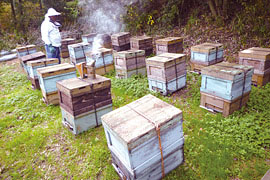The Mitsui & Co. Environment Fund
Introduction to Grant Projects
INDEX="388"
NAME="Honeybee preservation—building a foundation for sustainable beekeeping, agricultural production and ecosystem maintenance"
TYPE="研究助成,"
YEAR="2009年度,"
AREA="日本全国,中部,近畿,四国,九州・沖縄,"
KIND="大学,"
ORG="Graduate School of Bioagricultural Sciences, School of Agricultural Studies, Nagoya University Associate Professor Tatsuhiko Kadowaki"
Graduate School of Bioagricultural Sciences, School of Agricultural Studies, Nagoya University Associate Professor Tatsuhiko Kadowaki
Honeybee preservation—building a foundation for sustainable beekeeping, agricultural production and ecosystem maintenance
Research grant
- Project Description
Honeybee populations are declining on a global level; and there is now a shortage of pollination bees in Japan as well. In this research, we take up two types of honeybees, comparing the environments in which they are raised and susceptibility to disease. We also seek to build a foundation on which to develop technologies to: (a) enhance the natural immunity of honeybees; and (b), through an identification of stress indicator genes, a foundation on which to support sustainable beekeeping, agricultural production, and ecosystem maintenance.
- Fields
- Marine resources/foodPreservation of biodiversity and ecosystem
- Grant year
- FY2009 Research Grants
- Grant term
- 3 years
April 2010 - March 2013
- Grant amount
- 21,452,800 yen
- Activity region
- Ehime, Gifu, Mie, Kochi, Oita and other prefectures, Japan

Overview of the Organization

- Representative
- Associate Professor Tatsuhiko Kadowaki
- Profile
- Specialist field
Molecular ecology, neurobehavior
Affiliated academic societies
The Japan Neuroscience Society; Society of Evolutionary Studies, Japan; the Zoological Society of Japan; the Japanese Society for Comparative Physiology and Biochemistry; the Molecular Biology Society of Japan; the Japan Society for Bioscience, Biotechnology, and Agrochemistry
Background
Graduated (bachelor) in 1986 from the Faculty of Agriculture, Yamaguchi University. In 1988, Graduated from a Masters course in the Agricultural Research Department at Nagoya University. In 1994 completed a Ph.D from Graduate School, Division of Medicine, Case Western Reserve University. Was a Postdoctoral fellow from 1994-1996. Studied at Harvard Medical School from 1996-1997. JSPS research fellow at BioScience Center at Nagoya University in 1998, and JSPS research fellow, Department of Developmental Biology, Stanford University School of Medicine. In 1999 became a Postdoctoral fellow at the Department of Physiology in the University of California San Francisco School of Medicine. In 1999 took a position of Assistant Professor at the Graduate School of Bioagricultural Sciences at Nagoya University. In 2007 became an Associated Professor at same the institution. - Collaborating researchers
- Yasuyuki HASADA, Chairman, Nippon Yoho Hachimitsu Kyokai; Gifu Prefecture Bee Keepers Association; KAORU, Chairman, Aichi Prefecture Bee keeping association; YASUNAGI Nozaki, Chairman, Kochi Prefecture Lifestock Sanitation Assessment Office; HIDEMI Aki, General Manager, Oita Livestock Hygiene Department; SHITO Yozo, Chief Administrator, Mie Prefecture Central Livestock Hygiene Santiation Center; SUZUKI Yoshihisa, Principal; ARAKANO Tamio, Corporate Officer
- Research record
-
- (1) Honeybees of the world and reasons for their decline, Kagaku to Seibutsu 48, 577-582, 2010.
- (2) A conditional yeast mutant deficient in mRNA transport from nucleus to cytoplasm. Proc. Natl. Acad. Sci. USA.89, 2312-2316, 1992.
- (3) Drosophila segment polarity gene product Porcupine stimulates the posttranslation N-glycosylation of Wingless in the Endoplasmic reticulum. J. Biol. Chem. 277, 12816-12823, 2002.
- (4) Dynamic range compression in the honey bee auditory system toward waggle dance sounds. PLoS ONE 2,e234, 2007.
- (5) Honey bee thermal/chemical sensor, AmHsTRPA, reveals neofunctionalization and loss of TRP channel genes. J.Neurosci. in press.